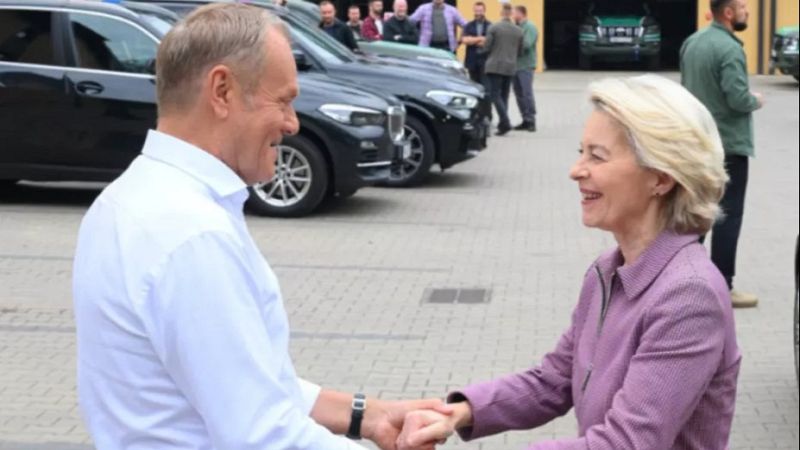Von der Leyen says Putin 'has not changed' and can only be kept in check through strong deterrence

European Commission President Ursula von der Leyen and Polish Prime Minister Donald Tusk arrived at the Polish-Belarusian border on Sunday, where they discussed defence and security, among other issues.
The EC chief assured Tusk and the Polish people of "Europe’s full solidarity with Poland as a frontline state," and stressed the importance of putting continued pressure on Russian President Vladimir Putin.
"Putin has not changed and will not change. He is a predator," the European Commission president said, adding that "he can only be kept in check through strong deterrence."
Von der Leyen's trip to Poland comes as part of her four-day tour of European states bordering Russia or its ally Belarus, aimed at stressing solidarity with border states and supporting the development of Europe's defence industry.
The pair visited the Polish-Belarusian border in a show of support for Poland and other states on the EU's eastern flank. The border has caused great contention since the beginning of a migration crisis in 2021, which Poland has described as "hybrid warfare" orchestrated by Belarus.
Poland as the largest defence spender in Europe and biggest beneficiary from SAFE
"This is the border we have to guard, in which we have to invest European money as well," Tusk said.
The EC chief turned to the Prime Minister with the comment: "It was during your Polish Presidency that we included €800 billion of investment in the defence plan," highlighting the EU's plans to strengthen the security of Poland and the bloc as a whole, including through the SAFE programme, an instrument designed to boost defence production across the bloc.
"This is €150 billion for joint purchases. So that we make our home, the European Union, stronger and safer," she said, adding that EU member states with direct borders with Belarus and Russia will receive additional funds.
Poland is the largest defence spender in Europe, and will be the biggest beneficiary from SAFE, von der Leyen wrote in a statement on X.
"To match Poland’s readiness, we have proposed a fivefold increase in defence investments. And a ten-fold increase in funding for military mobility," she added.
Tusk also revealed Poland's plans for future military investments.
"Poland will invest PLN 200 billion in defence next year, in the defence industry and in the Polish army. So we take our responsibilities seriously and we expect all institutions and countries in Europe to take the security of the eastern border equally seriously and to take a tough stance against the aggressor and against Russia," he said.
45th anniversary the August Agreements
The meeting between Tusk and von der Leyen coincided with the 45th anniversary the August Agreements, a historical deal between the communist government and striking workers that paved the way for the creation of the Solidarity Trade Union, the first independent trade union in the Eastern bloc, which played a pivotal role in the collapse of communism in Europe.
"We are not here to celebrate an anniversary," Tusk said, "I have chosen this place [...] to show what contemporary solidarity is about today."
"Solidarity was a great dream of independence, it was a great movement whose task was also to unite Europe and to separate itself from the evil world, from the evil empire of the time. And this border is as important today as our dream to liberate ourselves from Soviet domination was important then," he added.
Responding to Tusk's words on the anniversary of the key event, von der Leyen stressed Poland's resilience and commitment to security and defence cooperation.
"45 years ago, a wind of change blew through Poland, a wind strong enough to break the concrete of communism. Solidarity was a turning point not only for Poland, but for the whole democratic world, setting Poland on the path towards the EU," she said.
Von der Leyen’s visit Poland is part of a broader tour of EU countries bordering Russia and Belarus, which also includes Estonia, Lithuania, Finland, Latvia, as well as Bulgaria and Romania.
Today

